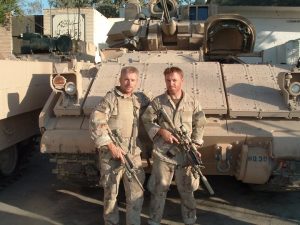MARSOC Origins – John A. Dailey
- MARSOC Origins – John A. Dailey Ben Buehler-Garcia 39:51
MARSOC is an abbreviation for Marine Forces Special Operations Command. While the Marines have fielded special operations forces before, (the “Raiders” conducted amphibious light infantry missions in World War II) there has always been some resistance within the Corps against establishing an elite unit within what many already consider an elite force.
The “Raiders” were disbanded in 1944. However, after the 9/11 attacks, Secretary of Defense Donald Rumsfeld directed the Marine Corps to establish a “proof of concept” unit that would report to US Special Operations Command. John A. Dailey was one of four team leaders selected to form the 1st Reconnaissance Company – Det. 1 for short. His Commander only gave him one prerequisite for the 86 men who would form the unit; “They must be tough rugged bastards with strong backs and hard feet”. “Tough Rugged Bastards” would become the title for John’s memoir of life in a Marine Special Operations Unit.
Dailey and his fellow Marines started from scratch, training for unknown missions in unknown locations. When they deployed to Iraq they adopted the name “Task Force Raider” in tribute to their WWII lineage. John shares some of the missions they conducted in Iraq. He emphasizes that their role providing personal Security for high profile Iraqi elected officials was probably their most important mission.
Det. 1 quickly won over the naysayers who doubted the Marine’s ability to operate successfully in the fluid and unconventional special operations environment. John says the toughest moment was when Det. 1 was disbanded but recognizes the necessity of that in order for the operations to be “built to scale” and create MARSOC.
John knew he wanted to become a Marine at seven years old when he saw one in his dress blues at a Fourth of July parade. His story of how he came to be a Marine sniper due to a clerical error is quite humorous.
TAKEAWAY: “Leaders should give guidance that is as specific as necessary but as broad as possible. This stirs creativity and engenders ownership of the task.”


























